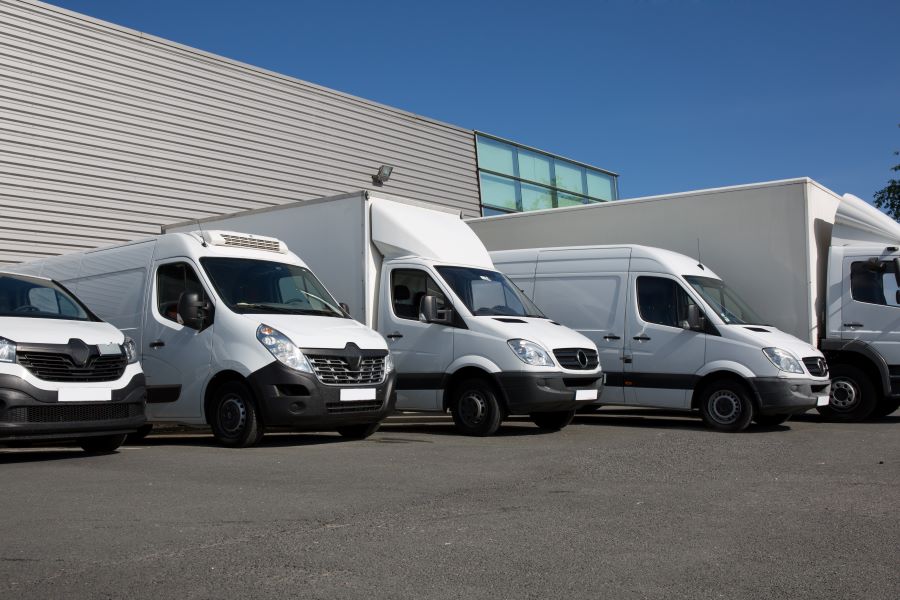
Business Insurance 101: Commercial Auto
Considering that the majority of us already have a personal auto policy for our family automobiles, commercial auto insurance is a simple concept to understand. The basic foundation of the policy’s coverage is the same, but where the difference lies is what the purpose of the vehicle is for. The following article will discuss the distinction between personal and commercial auto insurance, the coverages available on a commercial auto policy, the various rating factors that go into a commercial auto policy, and some instances in which a commercial auto policy is needed rather than a personal auto policy. Buckle up, there is a good bit to cover!
“What is Commercial Auto Insurance”
By definition, commercial auto insurance is a type of business insurance that covers vehicles you own or use for your business. This policy will help protect you and your company from financial loss when found at fault/liable for an auto-related accident.
Commercial auto policies vary in optics. It could be any one of a fleet of 100 work vans, a tow truck, a limousine, box trucks, or even a Honda Civic that is registered to a business. The primary idea behind commercial insurance is that a commercial auto policy is warranted if a vehicle is used for business purposes or is lawfully registered to a business.
“How much does Commercial Auto Insurance Cost?”
When a client is just starting their research, we frequently hear this question. The cost of auto insurance coverage is influenced by a wide range of variables. As a result of the advancement in technology, some carriers now use over 100 rating factors to determine how much a policy will cost. Some factors, nevertheless, will influence price more than others. In addition to the standard factors like location, amount of coverage, driving behaviors, and loss history, there are a few factors unique to the commercial environment to take into account. The following will also be taken into account.
- Industry of your business
- Type of vehicle (Car, Box truck, Tow truck, Heavy duty vehicle)
- Driver roster (How many drivers in the company)
- Size of the fleet (How many vehicles are you insuring)
- Driving radius (How far do you go for your jobs)
Effectively, all of these factors will affect your rate in one way or another. When running a business, some variables are well beyond your control. To keep costs in check, having a roster full of safe drivers with little to no loss history and vehicles with modern safety features is always a plus.
“What Coverages Go Into a Commercial Auto Policy?”
Your commercial auto policy, much like your personal auto policy, can include a variety of coverages. Your most common coverages are as follows:
- Liability Coverage
On auto policies, there are two types of liability coverage.
Bodily Injury, which is when you are found to be at fault in an accident and cause harm to another person.
Property Damage, which is for what you damage if you are found to be at fault in an automobile accident (another vehicle, guardrail, fence, etc.).
- Physical Damage Coverage
Collision Coverage is for when your car is damaged in a collision with another vehicle or object, your insurance will pay for the repairs.
Comprehensive Coverage will pay for non-collision-related vehicle damage (Theft, weather, fire, animal strikes, etc.).
- Uninsured/Uninsured Motorist Coverage
This will pay for property damage or injury if you are involved in an auto accident caused by another driver who is either uninsured or fails to have adequate coverage for your damages.
- Personal Injury Protection/ Medical Payments
This coverage will pay for medical expenses incurred by you and any occupants as a result of a car accident, regardless of who is at fault. Depending on the specific coverage, it may also pay for lost income and/or funeral expenses.
You can also add on additional coverages such as towing/roadside assistance, rental reimbursement, cargo coverage, and more. When searching for a commercial auto policy, it is highly recommended that you speak with an insurance professional about all of the coverage options available to you.
“Do I Need a Commercial Auto Policy”
A commercial auto policy is generally required if you own, lease, or hire a vehicle for business purposes. In fact, if your business transports people or goods, you are most likely required by law to have one. A commercial auto policy is also required if you have registered your vehicle under your company’s name.
With Uber and Lyft becoming more popular than ever, some personal lines policies may provide coverages with a specific endorsement to work in tandem with that rideshare company’s specific commercial coverages. It is strongly advised that you speak with your current insurance agent/broker about this in order to gain a better understanding of your specific policy.
“How Can I Purchase a Commercial Auto Policy?”
It is really easy to obtain commercial auto insurance. However, contacting an independent insurance agent/broker is the best way to ensure that you are getting the proper protections. An independent agent will have access to various commercial auto insurance markets and will be able to find the right carrier that offers the appropriate coverage at a competitive price point. Independent agents can also go over the costs and benefits of each coverage on your policy to ensure that your company is not underinsured and vulnerable to a catastrophic financial loss as a result of an auto accident.
When you’re ready to learn more about your commercial auto insurance options, contact The Staples Agency. With over 20 years of experience in the business insurance industry, we will be able to properly place coverage for you and provide guidance on risk management for your company.
